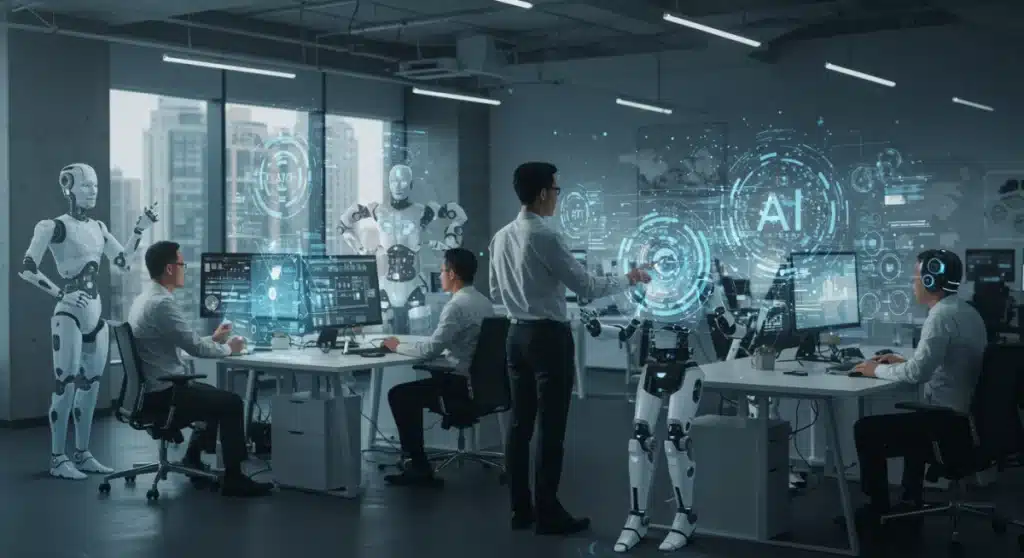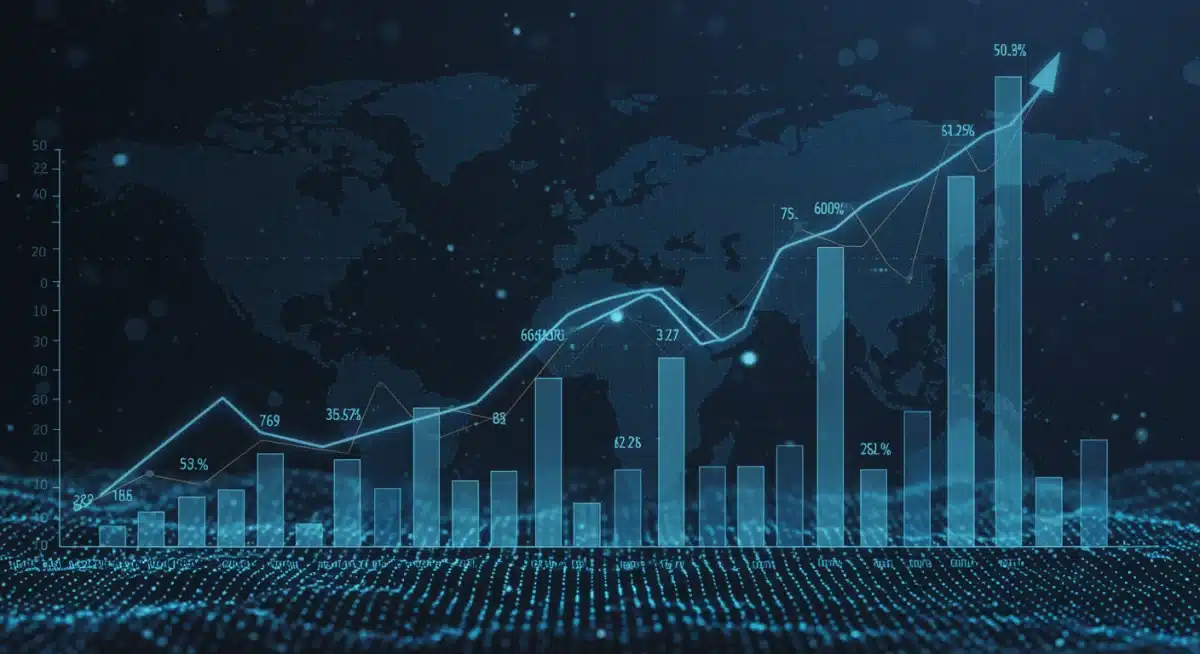The Future of Work: AI and Automation to Reshape US Jobs by 2025

The integration of AI and automation is poised to significantly transform US job markets by 2025, leading to both job displacement and the creation of new roles across various industries.
The landscape of employment is undergoing a rapid metamorphosis, with The Future of Work: How AI and Automation will Reshape US Job Markets by 2025 emerging as a central theme in economic discussions. As technology accelerates, understanding these shifts is crucial for workers, businesses, and policymakers alike. What does this mean for your career and the broader economy?
Understanding the AI and Automation Surge
The current surge in artificial intelligence (AI) and automation technologies is not merely an incremental change; it represents a foundational shift in how work is performed across the United States. Recent reports from leading economic analysts indicate that the pace of adoption has dramatically increased, particularly in the last 12-18 months. This rapid integration is driven by advancements in machine learning, robotics, and data processing capabilities, making sophisticated automation more accessible and cost-effective for businesses.
Industries ranging from manufacturing and logistics to customer service and even creative fields are now actively exploring or implementing AI-powered solutions. This widespread adoption is fundamentally altering job roles, requiring a re-evaluation of traditional skill sets and fostering a demand for new competencies. The implications extend beyond individual tasks, influencing entire business models and operational efficiencies.
Key Drivers of Adoption
Several factors are propelling the swift adoption of AI and automation across US industries. These include a desire for increased productivity, cost reduction through optimized processes, and the ability to handle large volumes of data with unprecedented speed and accuracy. The competitive global market also plays a significant role, pushing companies to innovate and leverage technology to maintain an edge.
- Productivity Gains: AI tools can automate repetitive tasks, freeing human workers for more complex, creative, or strategic endeavors.
- Cost Efficiency: Automated systems often reduce operational expenses, including labor costs and error rates.
- Data Processing: AI excels at analyzing vast datasets, providing insights that inform better business decisions.
- Enhanced Accuracy: Machines can perform tasks with a higher degree of precision and consistency than human counterparts in many scenarios.
Projected Job Displacement and Creation
As AI and Automation continue to integrate into the US economy, a dual impact on the job market is widely anticipated: significant displacement in certain sectors coupled with the creation of entirely new roles. Estimates vary, but a consensus among economists suggests that millions of jobs could be automated, particularly those involving routine, predictable tasks. This includes roles in administrative support, manufacturing, and transportation, which have historically been susceptible to technological advancements.
However, the narrative is not solely one of displacement. The development, deployment, and maintenance of AI systems themselves will necessitate a new workforce. This includes roles in AI engineering, data science, robotics technicians, and ethical AI oversight. Furthermore, jobs requiring uniquely human skills such as creativity, critical thinking, emotional intelligence, and complex problem-solving are expected to see increased demand and value.
Sectors Most Affected
Certain industries are projected to experience more pronounced changes than others. Manufacturing, an early adopter of automation, will see further shifts towards advanced robotics and smart factories. The retail sector, particularly in logistics and inventory management, is also ripe for increased automation. Conversely, sectors like healthcare, education, and creative industries may see augmentation rather than outright replacement, with AI serving as a powerful tool to enhance human capabilities.
The challenge lies in managing this transition effectively, ensuring that displaced workers have pathways to acquire the skills needed for emerging job opportunities. Government initiatives, educational institutions, and private sector training programs will be critical in bridging this skills gap. The goal is to maximize the benefits of automation while mitigating its potential societal disruptions.
Emerging Skills and Workforce Adaptation
The profound changes brought about by AI and Automation necessitate a significant adaptation of the US workforce. The emphasis is rapidly shifting from task-specific skills to broader, more adaptable competencies that complement AI capabilities. This means that while some traditional job functions may diminish, the demand for human skills that AI cannot easily replicate will soar.
Key among these emerging skills are those related to critical thinking, complex problem-solving, creativity, and emotional intelligence. As AI handles routine data analysis and repetitive processes, humans will be increasingly valued for their ability to interpret AI outputs, make nuanced decisions, innovate, and interact effectively with others. Digital literacy, including an understanding of how AI works and its ethical implications, will become a baseline requirement across many professions.
Reskilling and Upskilling Initiatives
To navigate this transition, widespread reskilling and upskilling initiatives are becoming imperative. Educational institutions, from K-12 to universities, are beginning to integrate AI literacy and future-proof skills into their curricula. Corporate training programs are also evolving to equip their existing workforce with the necessary competencies. The onus is not solely on individuals; governments and employers have a shared responsibility to invest in continuous learning opportunities.
- Digital Literacy: Basic understanding of AI, data, and digital tools is essential for almost all roles.
- Critical Thinking: Ability to analyze, evaluate, and synthesize information, especially AI-generated insights.
- Creativity and Innovation: Developing new ideas, products, or solutions that AI can then help implement.
- Emotional Intelligence: Skills such as empathy, collaboration, and communication become more valuable in human-centric roles.
- Adaptability: The capacity to learn new skills and adjust to changing work environments and technologies.
Economic Impact and Policy Responses
The economic impact of AI and Automation on US job markets by 2025 is projected to be multifaceted, influencing productivity, income distribution, and overall economic growth. While automation promises significant increases in efficiency and output, potentially leading to higher GDP, it also raises concerns about widening income inequality if not managed effectively. The benefits of increased productivity must be broadly distributed to prevent a concentration of wealth among those who own or control the AI technologies.
Policymakers are increasingly grappling with how to respond to these shifts. Discussions range from investing in robust social safety nets and universal basic income (UBI) experiments to reforming education systems and incentivizing private sector training. The goal is to harness the economic advantages of AI while ensuring a just and equitable transition for all workers.
Governmental and Corporate Strategies
Various strategies are being explored at both governmental and corporate levels. Governments are considering policies that support lifelong learning, expand access to broadband internet, and encourage innovation in emerging tech sectors. Corporations are investing in AI-driven tools to enhance worker capabilities rather than simply replace them, focusing on human-AI collaboration. Ethical guidelines for AI development and deployment are also becoming a critical area of policy focus, aiming to prevent bias and ensure responsible use.

Industry-Specific Transformations
The reshaping of US job markets by AI and Automation manifests differently across various industries. While some sectors anticipate significant disruption, others foresee a period of profound augmentation, where AI tools empower human workers to achieve more. Understanding these industry-specific transformations is key to preparing for the future of work.
In manufacturing, the shift towards lights-out factories and collaborative robots (cobots) is accelerating, requiring fewer manual laborers but more skilled technicians and engineers. The financial sector is leveraging AI for fraud detection, algorithmic trading, and personalized customer service, leading to a demand for data analysts and AI specialists alongside traditional financial roles. Healthcare is seeing AI assist in diagnostics, drug discovery, and patient care management, creating new roles for AI-savvy medical professionals and health informaticists.
Examples of Sectoral Impact
- Manufacturing: Increased automation of assembly lines, predictive maintenance, and quality control.
- Healthcare: AI-powered diagnostics, personalized treatment plans, and administrative automation.
- Retail: Automated inventory management, personalized shopping experiences, and AI chatbots for customer service.
- Transportation: Development of autonomous vehicles, optimized logistics, and drone delivery systems.
- Education: Personalized learning platforms, AI-assisted grading, and administrative task automation.
These examples illustrate a consistent theme: AI is not merely replacing jobs but transforming them, demanding new forms of human-machine collaboration and a higher level of cognitive skill from the human workforce. The pace of these changes varies, but the direction is clear across almost all economic sectors.
Ethical Considerations and Societal Impact
Beyond the economic and workforce implications, The Future of Work: How AI and Automation will Reshape US Job Markets by 2025 also brings a host of ethical considerations and broader societal impacts. The deployment of AI raises critical questions about data privacy, algorithmic bias, and the potential for increased surveillance in the workplace. Ensuring that AI systems are developed and used responsibly is paramount to building public trust and avoiding unintended negative consequences.
Algorithmic bias, for instance, can perpetuate and amplify existing societal inequalities if AI models are trained on unrepresentative or biased datasets. This could lead to unfair hiring practices, unequal access to opportunities, or discriminatory outcomes in various services. Addressing these issues requires a proactive approach involving diverse teams in AI development, robust ethical guidelines, and regulatory oversight.
Ensuring Responsible AI Development
The development of responsible AI is not just a technical challenge but a societal one. It involves establishing clear ethical frameworks, promoting transparency in AI decision-making, and fostering accountability for AI’s impact. Public discourse and education are also vital to ensure that citizens understand AI’s capabilities and limitations, enabling informed participation in shaping its future.
Moreover, the psychological impact of working alongside AI, the changing nature of human interaction in automated environments, and the potential for job insecurity all warrant careful consideration. Societies must prepare not just for economic shifts but also for the social and psychological adjustments that come with a highly automated world. This holistic approach is essential for a future where technology serves humanity effectively and ethically.
| Key Point | Brief Description |
|---|---|
| Job Displacement | Routine tasks in sectors like manufacturing and administration are highly susceptible to automation. |
| New Job Creation | AI development, data science, and roles requiring uniquely human skills are seeing significant growth. |
| Skill Shift | Demand is rising for critical thinking, creativity, emotional intelligence, and digital literacy. |
| Ethical Challenges | Concerns regarding algorithmic bias, data privacy, and equitable access to AI benefits are growing. |
Frequently Asked Questions About AI in the Workplace
No, AI is not expected to replace all human jobs by 2025. While it will automate many routine tasks and displace jobs in certain sectors, it will also create new roles and augment human capabilities, leading to a shift in required skills rather than a complete overhaul.
Critical thinking, complex problem-solving, creativity, emotional intelligence, and digital literacy are becoming increasingly vital. These human-centric skills complement AI’s analytical strengths, enabling workers to collaborate effectively with advanced technologies.
Individuals can prepare by engaging in continuous learning, focusing on upskilling and reskilling in areas like data science, AI ethics, and advanced digital tools. Developing soft skills such as adaptability and creativity is also crucial for long-term career resilience.
Sectors like manufacturing, logistics, customer service, and administrative support are expected to see significant transformation due to automation. However, AI will also profoundly impact finance, healthcare, and retail by augmenting existing roles and creating new ones.
Key ethical concerns include algorithmic bias leading to discrimination, data privacy issues, potential for job displacement exacerbating inequality, and the need for transparency and accountability in AI decision-making processes. Responsible AI development is crucial to address these challenges.
Looking Ahead: Navigating the AI-Driven Future
As The Future of Work: How AI and Automation will Reshape US Job Markets by 2025 rapidly approaches, the ongoing developments signal a period of continuous transformation. The immediate future will see increased investment in AI research and deployment, further integrating these technologies into daily operations across industries. Policymakers will likely focus more intently on educational reform and workforce development programs to ensure a smooth transition for displaced workers and to cultivate the skills needed for emerging roles. Businesses will need to strategize on how to leverage AI to enhance human potential, rather than solely for cost reduction, fostering a collaborative ecosystem between humans and machines. The dynamic interplay between technological advancement, economic policy, and societal adaptation will define the trajectory of the US job market in the years to come.





